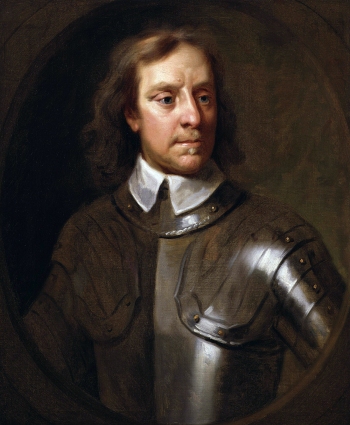Cromwell, Oliver
Born Apr. 25, 1599, in Huntingdon; died Sept. 3, 1658, in London. Outstanding figure of the English Bourgeois Revolution of the 17th century; leader of the Independents, and lord protector of England (from 1653). According to F. Engels’ estimate, he was the “Robespierre and Napoleon rolled into one” of the English Revolution (K. Marx and F. Engels, Soch., 2nd ed., vol. 1, p. 602).
Cromwell was born into a middle gentry family and began his political activity in 1628, when he was first elected to the House of Commons. Nevertheless, within the ranks of the Parliamentary opposition to Stuart absolutism Cromwell became well known only with the convocation in 1640 of the “Long Parliament,” in which he spoke out as an advocate of the interests of the bourgeoisie and the new gentry.
With the beginning of the first civil war against the king (1642–46), Cromwell with the rank of captain became head (in September 1642) of a volunteer cavalry detachment. Cromwell strongly advocated the democratization of the Parliamentary army, and he wanted to attract to it those who would fight against the king out of conviction rather than as mercenaries. In seeking out such “soldiers of God,” Cromwell turned to the yeomanry of eastern England, who were devout Puritans and hostile to outmoded feudal orders. Cromwell’s peasant cavalry (he commanded a cavalry regiment from the beginning of 1643) soon merited its nickname of “Ironsides” because of its tenacity and discipline. It became the nucleus of the Parliamentary army, which was reorganized upon Cromwell’s initiative at the beginning of 1645 (the “New Model Army”) and in which Cromwell was deputy commander in chief with the rank of lieutenant general. Cromwell’s skill as a general was most clearly manifested in the decisive battles of the first civil war—at Marston Moor (July 2, 1644) and at Naseby (June 14, 1645), where it was Cromwell’s cavalry that decided the success of these battles.
Although during the first civil war Cromwell reflected to a considerable degree the mood of the revolutionary democracy in the Parliamentary camp, after the victory over the king and the latter’s imprisonment, he retarded and restrained the movement of the popular masses. This led to a fierce struggle between Cromwell and the Levelers (1647). Caught between three political forces in 1647—the Presbyterian majority in Parliament, the army, and the imprisoned king—Cromwell showed himself to be a resourceful and evasive politician. Utilizing the army as his principal support, he carried on secret negotiations with the king at the same time, and he dealt harshly with disturbances among the soldiers.
When at the beginning of the second civil war (1648) Cromwell again needed the support of the masses, he made a temporary alliance with the Levelers. In 1648 he captured London, and with the aid of his soldiers he purged the House of Commons of the openly outspoken royalists (”Pride’s Purge” of Dec. 6, 1648). Under pressure from the lower classes, Cromwell was compelled to agree to the trial and execution of the king, the abolition of the monarchy and the House of Lords, and the proclamation of England as a republic. However, the republic that was declared in May 1649 was in fact a dictatorship by the so-called Meek Independents, headed by Cromwell.
The smashing of the Levelers’ uprising and the Diggers’ movement in England itself, the extremely harsh military expedition against rebellious Ireland (1649–50), Cromwell’s Scottish campaign (1650–51), and the plundering of Irish lands all testified to Cromwell’s transformation into the Napoleon of the English Revolution. By his growing conservatism and his hostility to the democratic aspirations of the masses Cromwell merited the trust of the bourgeoisie and the new gentry.
Officially appointed by Parliament in May 1650 as lord general and commander in chief of all the republic’s armed forces, Cromwell proceeded to establish his own personal dictatorship. On Apr. 20, 1653, he dissolved “the Rump” of the Long Parliament; in December 1653 he was proclaimed lord protector of England, Ireland, and Scotland. This protectorate regime transformed Cromwell into the de facto sovereign ruler of the country, the military might of which, forged during the course of the Revolution, was now placed at the service of the bourgeoisie’s trade and colonial expansion.
Cromwell’s outward grandeur, which reached its apex during these years, could not, however, conceal the weakness of the protectorate system. The class allies who had come to power strove to erect a more tenable barrier against the claims of the popular masses. Famed for his reputation as a regicide, Cromwell was in their eyes an insufficient guarantee against the common people. Cromwell’s right-wing enemies prepared secretly for a restoration of the Stuarts. By his own open anti-democratism Cromwell himself facilitated and expedited this restoration, which was carried out in 1660, shortly after Cromwell’s death.
SOURCES
The Writings and Speeches of Oliver Cromwell, vols. 1–4. Edited by W. C. Abbott. Cambridge, 1937–47.
REFERENCES
Angliiskaia burzhuaznaia revoliutsiia XVII v., vols. 1–2. Moscow, 1954. (Contains a bibliography.)
Barg, M. A. Kromvel’ i ego vremia. Moscow, 1950.
Pavlova, T. A. “Oliver Kromvel’: chelovek i politik.” Novaia i noveishaia istoriia, 1971, nos. 1–2.
Gardiner, S. R. History of the Commonwealth and Protectorate (1649–1656). New edition, vols. 1–4. London, 1903.
Buchan, J. Oliver Cromwell. London, 1949.
Hill, C. God’s Englishman: Oliver Cromwell and the English Revolution. London [1970].
Abbott, W. C. A Bibliography of Oliver Cromwell. Cambridge, 1929.
M. A. BARG
The Great Soviet Encyclopedia, 3rd Edition (1970-1979). © 2010 The Gale Group, Inc. All rights reserved.

